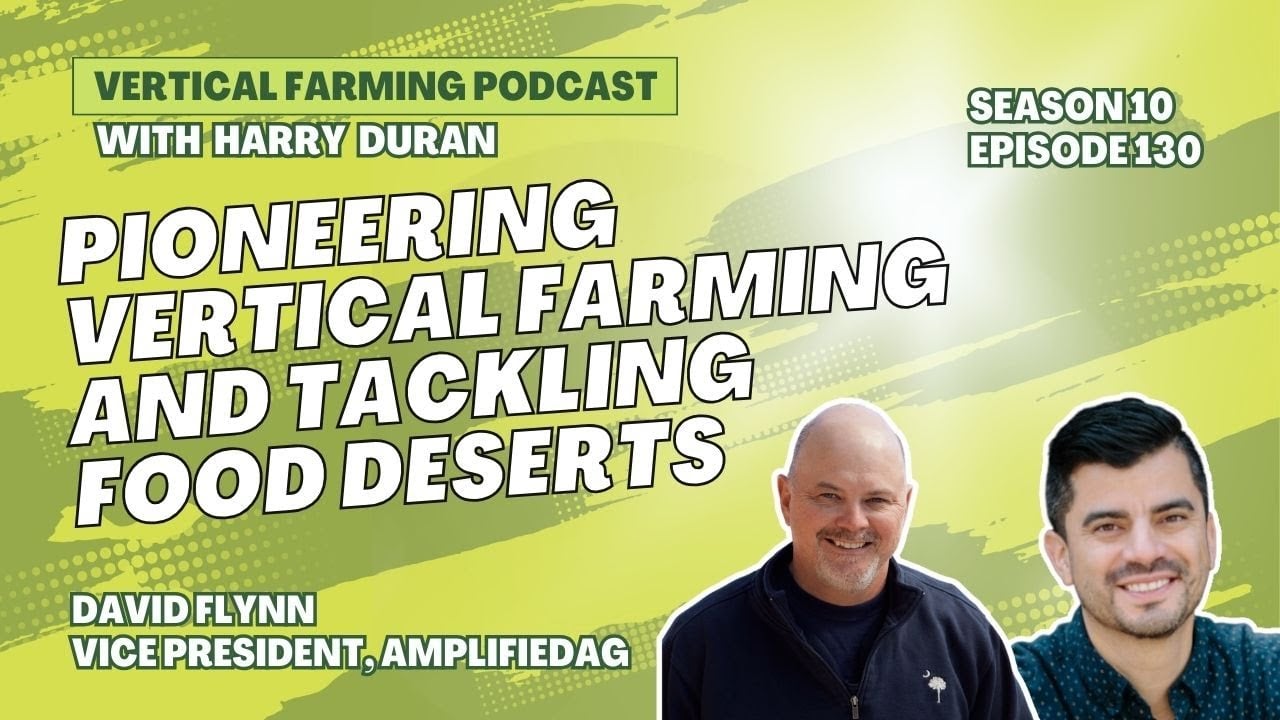Key Takeaways:
- David Flynn shared insights into AmplifiedAg’s development from warehouse software to a CEA technology provider.
- The company focused on refining its container farming systems before entering the commercial market.
- Hyperlocal distribution is a core aspect of AmplifiedAg’s model, aimed at minimizing logistics and improving freshness.
- Flynn emphasized challenges related to energy costs and called for greater policy inclusion for CEA in U.S. agriculture.
- AmplifiedAg is exploring partnerships for food security initiatives and expanding its research into crops beyond leafy greens.
David Flynn Reflects on Transition from Defense to Agriculture
David Flynn, CEO of AmplifiedAg, joined the Vertical Farming Podcast to discuss the company's evolution, its hyperlocal farming strategy, and broader industry challenges. With a background in military service and logistics, Flynn described how his experience abroad—particularly in Afghanistan—shaped his mission-driven interest in agricultural innovation.
“When I met Don Taylor, AmplifiedAg’s founder, the goal of merging technology with agriculture to support food access aligned with what I had seen in military operations involving local economies,” said Flynn.
David Flynn Describes Early Product Development and Company Structure
From Boxcar to AmplifiedAg
AmplifiedAg’s origins trace back to Boxcar Central, a logistics software company. Under Don Taylor’s direction, the company eventually shifted focus toward agriculture, merging with Tiger Corner Farms to create AmplifiedAg. David Flynn noted that the team spent seven years refining their farming system—primarily based on containerized production—before commercializing it.
Initially, the company operated a dual model: developing software and running a farm business (Vertical Roots) to test its technology in real-world conditions. The switch from aeroponics to a simpler NFT (nutrient film technique) system was a turning point, improving yield consistency and reducing system maintenance.
COVID-19 and the Shift to Retail Demand
The early months of 2020 brought significant operational changes. Flynn explained that restaurant closures reduced wholesale demand, but retail interest in produce increased. The team responded by scaling up production through container installations, further validating the system’s scalability.
“In the early days of the pandemic, retail sales created an unexpected growth opportunity,” said David Flynn.
Hyperlocal Farming as a Strategic Focus
Reducing Distribution Dependency
Flynn emphasized the importance of location in controlled environment agriculture. AmplifiedAg’s farms are positioned near distribution points to reduce logistics costs and preserve freshness. For example, its Atlanta farm is co-located with a distribution hub, allowing produce to travel only a few feet from harvest to dispatch.
“CEA works best when it’s deployed at the community level,” said David Flynn. “We’ve seen the model hold up in a variety of climates, from Alaska to Florida.”
Exploring Food Security and Research Applications
AmplifiedAg is involved in food security efforts in both urban and rural areas. According to Flynn, the company’s propagation containers are being used in collaboration with the USDA and the Governor’s School for Agriculture in South Carolina. The systems are also being tested for crops such as carrots and potatoes in partnership with research labs and non-profits.
One such deployment in Ketchikan, Alaska required a combination of road, barge, and truck transport. Flynn described it as one of the most logistically complex installations, but the container maintained its climate control even under snow cover.
David Flynn on Power Costs and Policy Gaps
Energy expenses emerged as a key concern. David Flynn cited electricity prices—up to $0.30 per kilowatt hour in some cities—as a significant barrier. AmplifiedAg is exploring renewable energy options and advocating for controlled environment agriculture to be more formally recognized in federal farm policy.
“We need broader inclusion of CEA in the Farm Bill and access to the same programs that support traditional agriculture,” said Flynn. “Without this, long-term viability remains a concern, particularly for smaller operators.”
Collaboration and Industry Maturity
Flynn observed a shift in how the CEA industry operates today compared to when he joined in 2016. While early years were marked by a lack of information-sharing, recent challenges have led to more collaboration among stakeholders.
“There’s more openness now,” said David Flynn. “The industry understands that success is going to require alignment on permitting, power challenges, and legislative support.”
Looking Ahead for AmplifiedAg
David Flynn concluded the conversation by noting AmplifiedAg’s current focus on community-based food security initiatives. These include partnerships with local governments, schools, and international organizations.
“We’re most encouraged by projects that bring fresh food to underserved areas using scalable, hyperlocal systems,” he said.


